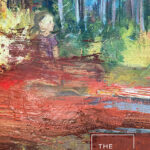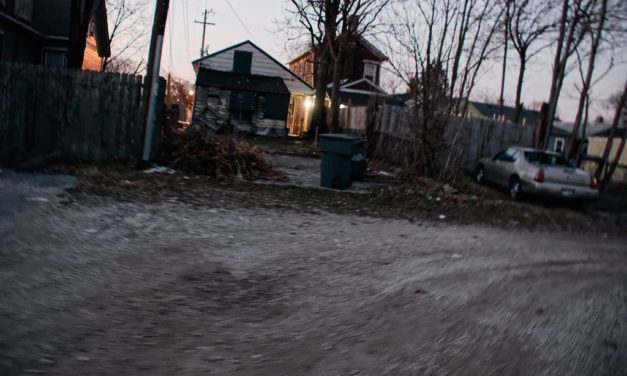Category: Why We Like It
Why We Like It: “Hotshot” by Jaclyn Dw...
Posted by Cincinnati Review | Jun 3, 2021 | Why We Like It | 0
Why We Like It: Patch Kirschenbaum’s “For Future R...
Posted by Cincinnati Review | Apr 1, 2021 | Why We Like It | 0
Why We Like It: “The Experiment” by Sa...
Posted by Cincinnati Review | Feb 11, 2021 | Why We Like It | 0
Why We Like It: “Earth Shovel” by Dan ...
Posted by Cincinnati Review | Jan 5, 2021 | Why We Like It | 0
Why We Like It: “Erase the Days” by Ja...
Posted by Cincinnati Review | Oct 22, 2020 | Why We Like It | 0
Why We Like It: “Here or Somewhere Else, or, The Grain Silo” by Sharon Kunde
by Cincinnati Review | Jan 20, 2023 | Why We Like It | 0
We revisit Sharon Kunde’s haunting, wrecked landscape with its trains, silos, and blurring speed.
Read MoreWhy We Like It: “Hotshot” by Jaclyn Dwyer
by Cincinnati Review | Jun 3, 2021 | Why We Like It | 0
“Hotshot” closes with the realization that sometimes a fire gets too hot and high for anything else to stop it. These final lines can also serve as a metaphor for addiction—sometimes the fire of it can only be put out with more fire…
Read MoreWhy We Like It: Patch Kirschenbaum’s “For Future Reference: Notes on the 7-10 Split”
by Cincinnati Review | Apr 1, 2021 | Why We Like It | 0
I could go on and on about Kirschenbaum’s striking (ha) images, characterization, and humor, but what really made this story stand out to me was its powerful use of second person point-of-view.
Read MoreWhy We Like It: “The Experiment” by Sarah Fawn Montgomery
by Cincinnati Review | Feb 11, 2021 | Why We Like It | 0
Sarah Fawn Montgomery’s essay “The Experiment” shows how extensively the patriarchy has affected our education system and how these practices perpetuate sexual violence toward women.
Read MoreWhy We Like It: “Earth Shovel” by Dan Albergotti
by Cincinnati Review | Jan 5, 2021 | Why We Like It | 0
Dan Albergotti’s poem “Earth Shovel” asks us to think deeply about the way we inhabit Earth in a time when oil is money, and drilling becomes commonplace despite its environmental costs.
Read MoreWhy We Like It: “Erase the Days” by Jason Ockert and “Recurring” by Lyndsey Reese
by Cincinnati Review | Oct 22, 2020 | Why We Like It | 0
I’m resistant to making generalizations about genres. I’m of the general opinion that poetry and fiction use the same ingredients, just with wildly different doses.
Read MoreWhy We Like It: “Respair” by Craig van Rooyen and “Seven Facts” by Christina Olson
by Cincinnati Review | Oct 15, 2020 | Why We Like It | 0
Poetry gives me the shivers in part because it carves out new spaces to inhabit, however briefly, and this allows readers to see the world as something new.
Read MoreWhy We Like It: “How to Retile Your Bathroom in 6 Easy Steps!” by Gwen E. Kirby
by Cincinnati Review | Jan 30, 2020 | Why We Like It | 0
Gwen E. Kirby’s “How to Retile Your Bathroom in 6 Easy Steps!” utilizes the conventions of an instructional manual to uniquely represent the interiority of a woman experiencing disruption and loss.
Read MoreWhy We Like It: “Reverberation” by Nancy Chen Long
by Cincinnati Review | Jan 9, 2020 | Why We Like It | 0
Nancy Chen Long’s poem “Reverberation” fights back against silence and erasure. The poem’s title points toward the resonance of sound, and this is exactly what Chen Long’s words do: even in stillness the music of her language ripples across the page.
Read MoreWhy We Like It: “Operation Rhododendron” by Samyak Shertok
by Cincinnati Review | Dec 12, 2019 | Why We Like It | 0
In the opening lines of Samyak Shertok’s “Operation Rhododendron,” everyday objects transform into makeshift weapons for role-playing scenes of war.
Read MoreWhy We Like It: “Next to Us: Sonnets, Divided” by Lis Sanchez
by Cincinnati Review | Oct 31, 2019 | Why We Like It | 0
In “Next to Us: Sonnets Divided,” Sanchez skillfully considers what it means to be both simultaneously inside and outside acts of violence.
Read MoreWhy We Like It: “A Detail from the Bayeux Tapestry, 11th c.” by Jacques J. Rancourt
by Cincinnati Review | Aug 8, 2019 | Why We Like It | 0
Jacques J. Rancourt’s fabulous poem “A Detail from the Bayeux Tapestry, 11th c.” moves beyond simple description, employing the tools of the best ekphrastic work…
Read More
Recent Posts
-

-
 from “The Theft” by Rebecca BernardDec 18, 2024 | Samples
from “The Theft” by Rebecca BernardDec 18, 2024 | Samples -
 miCRo: “The Man Under the Blanket” by Lisa ThorntonDec 18, 2024 | miCRo
miCRo: “The Man Under the Blanket” by Lisa ThorntonDec 18, 2024 | miCRo -

-
 miCRo: A poem by Alex Wells ShapiroDec 11, 2024 | miCRo
miCRo: A poem by Alex Wells ShapiroDec 11, 2024 | miCRo












